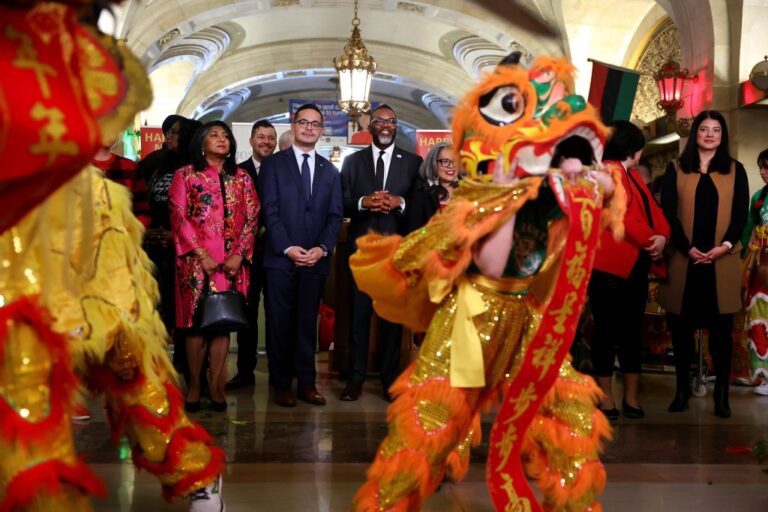Celebrating Lunar New Year in Chicago: A Political Reflection
The lobby of City Hall was awash in crimson and gold as Mayor Brandon Johnson and a small group of local Asian American politicians convened for a Lunar New Year celebration. Flanked by young, bedazzled Chinese lion dancers, Johnson attempted to honor Ald. Nicole Lee for being the first Asian American to represent Chicago’s 11th Ward. Lee, the City Council’s first alderman of Chinese descent, soon winced at how he described her Near South Side community — the city’s first Asian-majority ward.
So goes the high wire Lee has walked since being appointed by former Mayor Lori Lightfoot to the City Council in 2022, after a once-a-decade redistricting process afforded Asian residents a precarious 50.1% majority in the new 11th Ward.
Since then, seven other Asian American newcomers to politics have won elected office across Illinois, more than doubling their numbers within two years.
Lee said the recent momentum makes the wide-ranging priorities for Chicago’s Asian community all the more pressing as the budding coalition navigates a renaissance as the city’s fastest-growing racial group, jumping by almost one-third from 2010 to 2020. At the same time, the city’s entrenched racial politics have continued to play out in power struggles between the Black and Latino caucuses, but how the Asian American community fits remains to be seen.
“We absolutely have the opportunity before us to make sure that we don’t backslide, because as it goes in politics, if you’re not at the table, you’re on the menu. We’re at the table now,” Lee said. “Especially now that we’ve got some political power, we don’t want to squander that.”
Two years ago, Lee’s entrance to the City Council catalyzed what many in Chinatown saw as a watershed moment for their community. Now, there are a total of 13 Asian Americans serving in elected office on the city, county and state levels. Following the 2023 citywide election, Chicago now has a record number of two aldermen of Asian descent: Lee and Filipina American Leni Manaa-Hoppenworth, 48th.
Before Lee’s time, Ameya Pawar served as Chicago’s first alderman of Asian descent, representing the North Side 47th Ward from 2011 to 2019.
Illinois’ other Asian American politicians include nine Springfield lawmakers — four hailing from Chicago — with ethnicities from all over the continent. Cook County Commissioner Josina Morita and Lake County Treasurer Holly Kim have held local offices since 2016 and 2018, respectively.

Historical Context and Racial Dynamics
“We’re a city that can elect an Asian American woman to a ward that has been known for its racism,” Johnson declared. Johnson later explained he was nodding to Chicago’s “harsh reality” of deep segregation, emphasizing the need to address racism across the city.
The 11th Ward, now home to Chinatown and Bridgeport, played a significant role in the city’s 1919 race riots and was a longtime power center for the Irish-controlled Democratic political machine. That a Chinese American woman now represents this historic ward highlights the challenges and opportunities facing Asian American elected leaders in Chicago.

Political Progress and Challenges
Ald. Nicole Lee, appointed by former Mayor Lori Lightfoot in 2022, symbolizes a significant political shift for Chicago’s Asian community. Since her appointment, seven other Asian American newcomers have won elected office across Illinois, doubling their numbers in two years. The Asian community, the city’s fastest-growing racial group, saw a 30% population increase from 2010 to 2020.
“We absolutely have the opportunity before us to make sure that we don’t backslide,” Lee said. “We’re at the table now, especially now that we’ve got some political power, we don’t want to squander that.”
A New Wave of Representation
Two years ago, Lee’s entrance to the City Council catalyzed what many in Chinatown saw as a watershed moment. Chicago now has 13 Asian Americans serving in elected office at city, county, and state levels. Following the 2023 citywide election, Chicago boasts two aldermen of Asian descent: Lee and Filipina American Leni Manaa-Hoppenworth, 48th Ward.
Before Lee, Ameya Pawar served as Chicago’s first alderman of Asian descent from 2011 to 2019. Illinois’ other Asian American politicians include nine Springfield lawmakers and local offices held by Cook County Commissioner Josina Morita and Lake County Treasurer Holly Kim since 2016 and 2018, respectively.
Diversity in Political Leadership
Despite the progress, some leaders have expressed concerns about regression since Johnson took office. Under Lightfoot, three Asian American women led her finance team, but Johnson has made no Asian American appointments to his cabinet or top deputy positions. Johnson’s chief of staff, Cristina Pacione-Zayas, acknowledged the need for more work but highlighted ongoing conversations about future appointments.
Historical Exclusion and Current Advocacy
Asian Americans’ political rise has lagged behind other communities of color due to historical exclusions like the 1882 Chinese Exclusion Act. The community has made strides with achievements such as a 2021 law requiring public schools to teach Asian American history and the Language Equity and Access Act mandating state agencies to provide language access plans and translations.
The Future of Asian American Political Power
As the Asian American community navigates its growing political presence, unifying their agenda remains crucial. The diverse Asian population in Chicago, comprising over 30 different ethnic groups, faces challenges in creating a cohesive political strategy. However, increased political participation is seen as a positive development, dispelling the notion that these communities are uninterested in politics.
Keeley Chiu, a junior at Jones College Preparatory, represents the next generation of Asian Americans getting involved in politics. “A lot of the time Asians are forgotten as a minority,” Keeley said. “Our Asian community, I think, definitely needs to be more recognized.”
By continuing to advocate for representation and address the unique needs of their diverse community, Asian American leaders and their allies aim to ensure their voices are heard and their political power continues to grow.

ayin@chicagotribune.com
